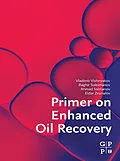Primer on Enhanced Oil Recovery gives the oil and gas market the introductory information it needs to cover the physical and chemical properties of hydrocarbon reservoir fluids and rock, drilling operations, rock-fluid interactions, recovery methods, and the economy of enhanced oil recovery projects. Beginning with introductory materials on basic physics and oil-rock interaction, the book then progresses into well-known types of EOR, such as gas injection and microbial EOR. Other sections cover hybrid EOR, smart water/low salinity and solar EOR. Worldwide case study examples give engineers the go-to starting point they need to understand the fundamentals of EOR techniques and data. - Discusses basic physics and chemistry in oil, oil-rock interaction, variation of oil, and interaction properties with temperature - Helps readers understand why and when EOR can be used - Includes data on EOR implementation and economics
Autorentext
Vladimir Vishnyakov PhD, SPE, FInstP, Director of Institute for Materials Research, University of Huddersfield. Vladimir has extensive track record in Materials Research and Surface Analysis. Vladimir lectures and supervises postgraduate students in Enhanced Oil Recovery methods and techniques at the University of Huddersfield.
Klappentext
Primer on Enhanced Oil Recovery gives the oil and gas market the introductory information it needs to cover the physical and chemical properties of hydrocarbon reservoir fluids and rock, drilling operations, rock-fluid interactions, recovery methods, and the economy of enhanced oil recovery projects. Beginning with introductory materials on basic physics and oil-rock interaction, the book then progresses into well-known types of EOR, such as gas injection and microbial EOR. Other sections cover hybrid EOR, smart water/low salinity and solar EOR. Worldwide case study examples give engineers the go-to starting point they need to understand the fundamentals of EOR techniques and data.
- Discusses basic physics and chemistry in oil, oil-rock interaction, variation of oil, and interaction properties with temperature
- Helps readers understand why and when EOR can be used
- Includes data on EOR implementation and economics
Inhalt
1. Introduction
2. Hydrocarbon and Oil reserves classification
3. Basic physical and chemical concept
4. Fluids-rock interactions
5. Reservoir mineralogy and rock fluid properties
6. Introduction to well technology
7. Oil recovery stages and methods
8. Thermal EOR
9. Ternary diagrams
10 Gas flooding
11 Water alternate gas injection
12 Chemical EOR
13 Microbial EOR
14 Forefront EOR
15 EOR modelling
16 EOR on site implementation
17 EOR economics
